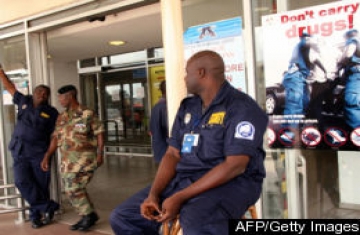
GlobalPost.com
Tristan McConnell
January 26, 2009
ACCRA, Ghana — West Africa is an unlikely center for the international cocaine trade. It is not a producer of the drug nor is it a consumer, as the vast majority of its people are very poor.
Yet a startling 50 tons of cocaine is transported through West Africa each year, according to the latest United Nations estimates. The value of this illicit trade dwarfs entire economies and has the potential to corrupt the region’s fragile states, which are just pulling out of decades of bitter civil wars.
In the past Africa has been a treasure trove looted by covetous colonialists, voracious rebels and kleptocratic rulers — over the last 300 years think slaves, ivory, gold, diamonds, tin and coltan. Now it is a transit point and storeroom for the cocaine trade.
“Drug money is perverting the weak economies in the region,” says Antonio Maria Costa, executive director of the U.N. Office on Drugs and Crime. The wholesale value in European streets of cocaine passing through West Africa is $2 billion, he says.
South American cartels used to transport cocaine to the big U.S. market via the Caribbean. But dwindling American consumption, stricter control of the West Indies drugs route, growing cocaine use in Europe and weak law enforcement in West Africa have conspired to bring the drug to the region. It is the path of least resistance.
Grown and processed in South America, the refined cocaine is transported by boat or plane across the Atlantic: The shortest line of latitude brings the cargo straight to West Africa. From there the cartels move the drugs onwards to Europe, along the way paying off West African officials in order to be able to operate freely.
The cocaine consignments can also be moved by corrupt officials in the army, customs and police forces. The packages are split up and distributed by criminal gangs who use boats, trucks, planes or human mules to transport the drugs to Europe, which is in the throes of a cocaine boom reminiscent of the U.S. in the 1980s.
Several West African countries risk becoming narco-states — undermined by drug money their nascent institutions are stillborn. This is a global concern because this part of Africa provides resources that the world depends on, including oil. The U.S. gets almost one-fifth of its crude from Africa.
“Already we have seen how the impact of drugs has affected the judiciary, the police, customs and political parties,” says Kwesi Aning at the Kofi Annan International Peacekeeping Training Centre in Accra. He says Ghana and Guinea-Bissau are the two main cocaine hubs in West Africa. Aning says the drug trade is a threat to Ghana, which currently is an oasis of political and economic stability in a volatile region.
Individual shipments of hundreds of kilos of cocaine have been found in recent years in Ghana, Guinea, Guinea-Bissau, Senegal, Sierra Leone and elsewhere. But the seizures are more the product of luck than design, and prosecutions rarely follow.
Traffickers are frequently released for lack of evidence or jump bail, while hauls of cocaine locked in secure storage rooms disappear and senior officials implicated in the trade hold onto their jobs and buy flashy new SUVs to navigate their capitals’ potholed streets.
The U.N. reckons that the traffickers might make $450 million each year, which would mean that the criminals have more financial resources than the states in which they operate. A policeman earning less than $50 a month is easily bribed, so is a customs official, a security agent or even a government minister.
At the other extreme is the example of Sierra Leone, where millions of dollars earned from the sale of “blood diamonds” — another illegal trade — helped prolong a civil war, leaving the country in bloody ruin when the fighting stopped in 2003.
The death of Guinea’s elderly president, Lansana Conte, in late December sent shivers down the spines of drugs experts who fear a large failed state in the region will only encourage the cartels.
The threat is growing, but observers say it is not too late for concerted international action.
“We can break the back of this crisis, but we don’t have much time,” warns Aning. “We need to do this within the next two years otherwise …” And with that he shakes his head.
More news at GlobalPost.com.


























May god bless and prosper our homeland Ghana, and make our nation great and strong. May god protect and defend our nation Ghana, in all area; spiritual, emotional, economical, social, political, and may the light of god shine over the land. May the salt of god season the land from all the worms that pass through the system and boarders. Help us lord is our petition, say Amen.
Really great information, I really enjoyed reading it.